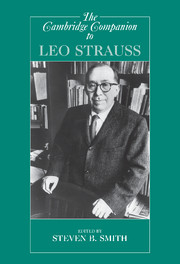Book contents
- Frontmatter
- 1 Introduction: Leo Strauss Today
- 2 Leo Strauss: The Outlines of a Life
- 3 Leo Strauss and the “Theologico-Political Predicament”
- 4 Strauss’s Recovery of Esotericism
- 5 Strauss’s Return to Premodern Thought
- 6 Leo Strauss and the Problem of the Modern
- 7 The Medieval Arabic Enlightenment
- 8 “To Spare the Vanquished and Crush the Arrogant”: Leo Strauss’s Lecture on “German Nihilism”
- 9 Leo Strauss’s Qualified Embrace of Liberal Democracy
- 10 Strauss and Social Science
- 11 The Complementarity of Political Philosophy and Liberal Education in the Thought of Leo Strauss
- 12 Straussians
- Bibliography
- Index
- Series List
10 - Strauss and Social Science
Published online by Cambridge University Press: 28 November 2009
- Frontmatter
- 1 Introduction: Leo Strauss Today
- 2 Leo Strauss: The Outlines of a Life
- 3 Leo Strauss and the “Theologico-Political Predicament”
- 4 Strauss’s Recovery of Esotericism
- 5 Strauss’s Return to Premodern Thought
- 6 Leo Strauss and the Problem of the Modern
- 7 The Medieval Arabic Enlightenment
- 8 “To Spare the Vanquished and Crush the Arrogant”: Leo Strauss’s Lecture on “German Nihilism”
- 9 Leo Strauss’s Qualified Embrace of Liberal Democracy
- 10 Strauss and Social Science
- 11 The Complementarity of Political Philosophy and Liberal Education in the Thought of Leo Strauss
- 12 Straussians
- Bibliography
- Index
- Series List
Summary
As early as 1932, long before he joined any department of political science, Strauss wrote of the necessity of a radical criticism of the work of Max Weber; three years later, he wrote to his friend, Jacob Klein, that he has been reading a lot of Weber. His famous criticism of Weber in Natural Right and History was then the result of a twenty-year long reflection on that thinker. Indeed, he incorporated a criticism of present-day social science in a number of essays, and in small ways in every book he wrote in the United States other than his later Socratic books. He even organized a reading group with some of his students on the works of the leading scholars (Harold Lasswell, Arthur Bentley, Herbert Simon, and so on) around what he called the new science of politics, or what others have called the behavioral revolution in political science. This effort culminates in the publication of the Essays on the Scientific Study of Politics, the epilogue to which is written by Strauss himself. Why did this single-minded student of political philosophy devote so much of his time and energy to a critique of contemporary social science? This question assumes that political philosophy and social science are fundamentally different activities. However, Strauss questioned this assumption because he denied its underlying premise, namely, that modern natural science is the model for all scientific work. Accordingly, he can distinguish “present day social science” (social science positivism in its final form) from “classical social science” (the political science of Plato, Aristotle, and Xenophon) and “modern social science” (the political science of Machiavelli, Hobbes, Locke, Montesquieu), categories that do not exist for adherents of present-day social science.
- Type
- Chapter
- Information
- The Cambridge Companion to Leo Strauss , pp. 215 - 240Publisher: Cambridge University PressPrint publication year: 2009
- 2
- Cited by



